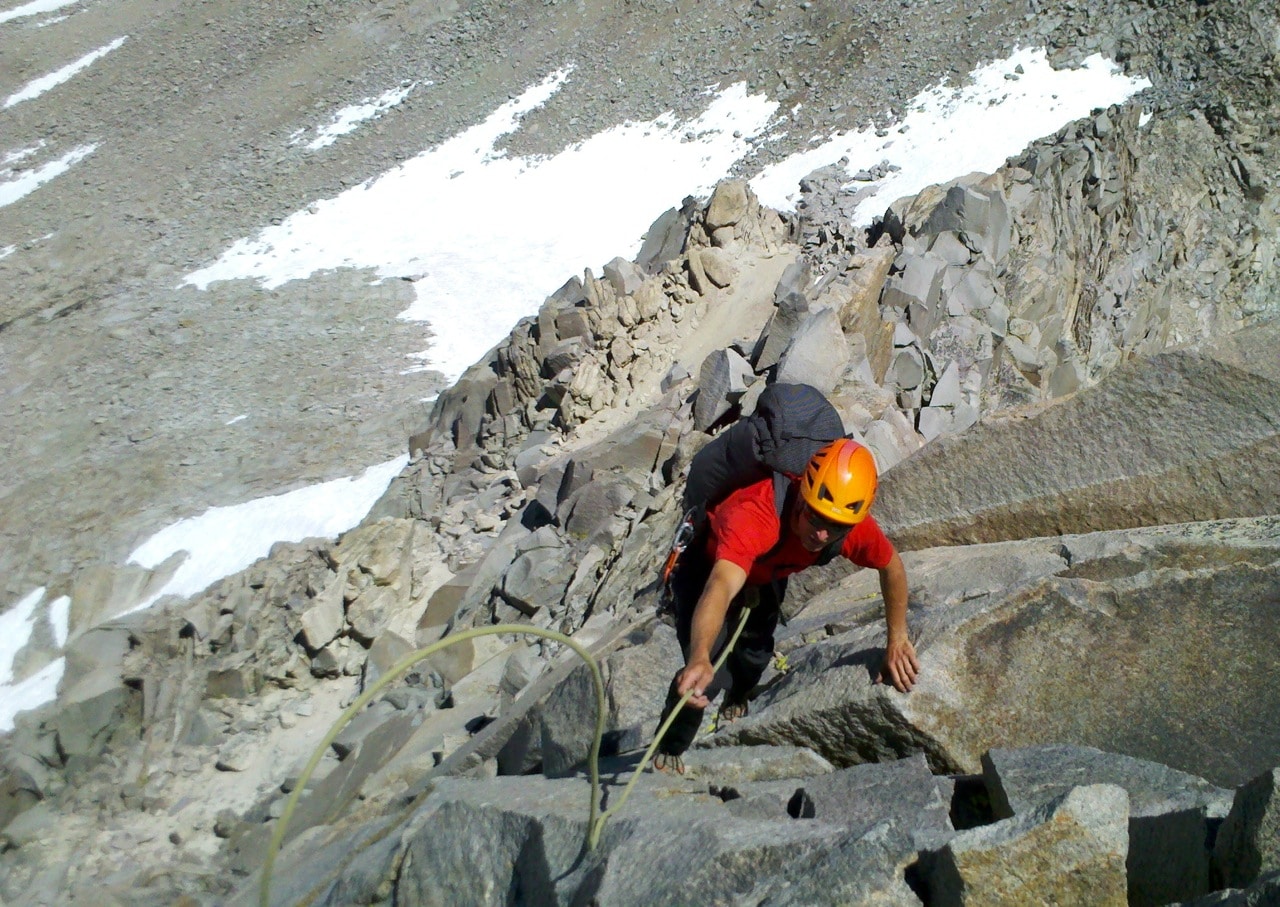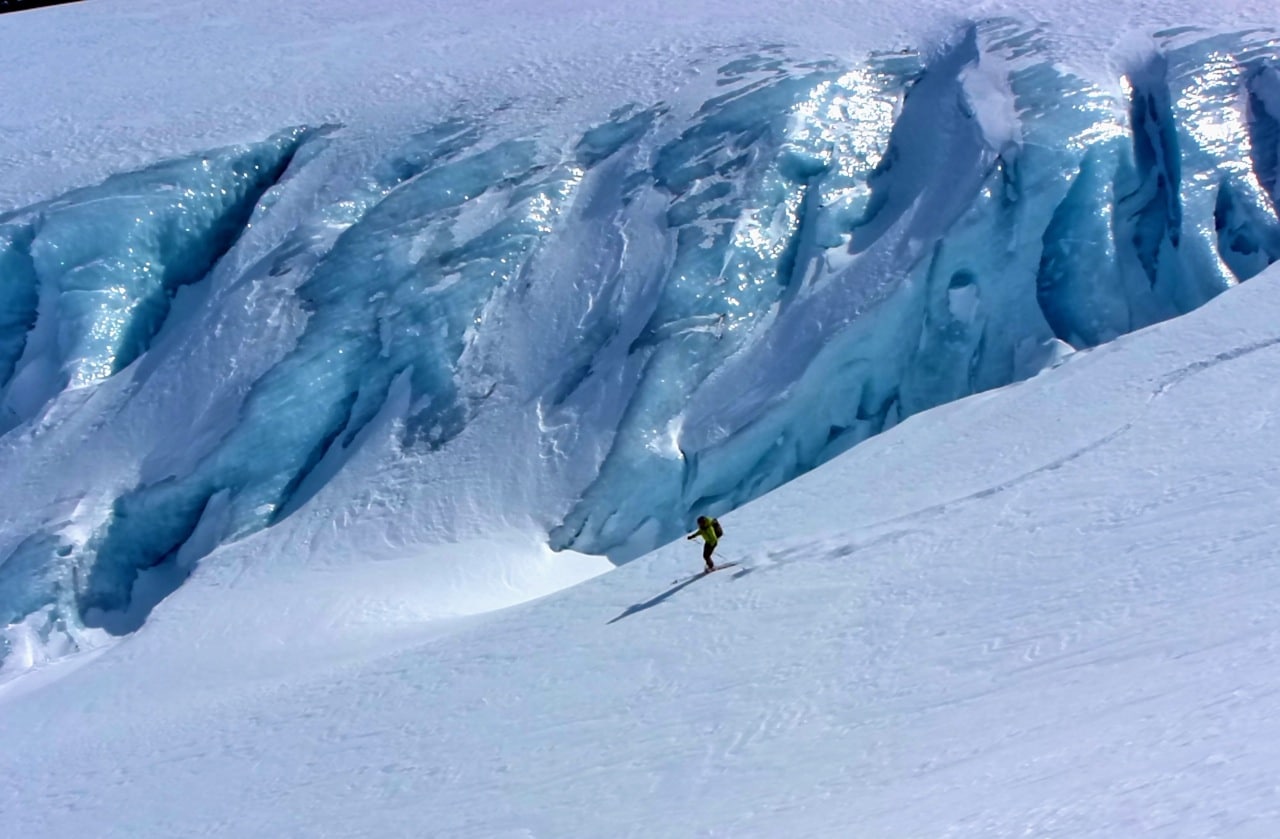
Rock climbing in Kings Canyon National Park, California. Photo credit: Alexandra Few.
Once again we return to our So You Want My Job series, in which we interview men who are employed in desirable jobs and ask them about the reality of their work and for advice on how men can live their dream.
Many men climb mountains simply because they are there. An unbeatable reason. But if you can also get paid to climb them, well that could be pretty sweet too. No, you won’t get wealthy off being a mountain guide. But you will have a job that’s physically challenging, intellectually stimulating, and allows you to spend your days out in nature and your nights sleeping under the stars. Today mountain guide Jediah Porter tells us about the pleasures and challenges of this rugged and adventuresome line of work.
1. Tell us a little about yourself (Where are you from? How old are you? Describe your job and how long you’ve been at it, etc).
I was born in 1979, grew up in the Catskills of New York state, earned a bachelors degree in Natural Resources from the University of Maine, and have lived in Bishop, CA since 2002. I work year-round here in the Sierra Nevada as a mountain guide. In the winter that means taking people backcountry skiing and ice climbing and teaching the skills associated with these activities. In the summer the work is an even mix of rock climbing, mountaineering, and backpacking.
2. Why did you want to become a mountain guide? When did you know it was what you wanted to do?
I think I always knew I wanted to be a guide, but didn’t know it was an option until my early 20s. As long as I can remember, I felt strongly that I wanted to work in an environment that was both physically and intellectually stimulating. It’s a combination of perks and challenges that I can’t imagine encountering in any other job.
3. How do you become a mountain guide? What kind of courses and certifications do you need? Do you do an apprenticeship with another guide?
In short, the process of becoming a mountain guide here in the US has been in flux. Up to now there has been no training or certification requirement. In fact, there are still no legal requirements for guide employment. One can get a job guiding with very little experience. However, and I can say this on good authority, sustainable and enjoyable employment is only possible with the pursuit of certification through the American Mountain Guides Association (AMGA). Many people work seasonally, or short-term, or in relatively menial positions without any formal training.
All of my peers have earned or are in the process of securing one or more certifications through the AMGA. The organization certifies guides in three disciplines: rock climbing, alpine climbing/mountaineering, and ski mountaineering. I have been taking courses and exams since 2007 and have earned full rock and alpine certification. All of my ski coursework is complete and I am enrolled in the final exam in April 2013. Upon completion of the ski mountaineering guide certification, I will join fewer than 100 US guides with the internationally recognized trilogy of credentials.
An apprenticeship is also crucial. The certification process requires employment as a guide between courses and exams. Having mentorship for these ongoing work obligations ensures safety for the involved clients and maximum educational benefit for the aspiring guide.
4. What kind of job opportunities are out there for mountain guides? Can you work as a guide for a company or set yourself up as an independent guide-for-hire? If you pursue the latter option, how do you go about finding clients who will hire you for your services?
The nature of one’s employment as a guide is limited by public land access. Most mountain terrain in the United States is on public land. All commercial use of public land requires permission. In some areas, particularly those with mountain peaks and routes most sought-after, all existing permits are already held by operating companies. As a result, most guides work for at least one company. A guide can align himself primarily with a single company and rely on that company for ongoing employment. Another option is to market oneself as an individual guide and work through a patch-work of employment and permitting. Guides like to be in the mountains, and are thus particularly poor at marketing themselves. Any ideas there are welcome…
5. How competitive is it to get hired by one of the companies you mentioned? What sets a candidate apart from others when he’s applying?
Guiding is a very appealing job. Some call it “sexy.” Many entertain a casual interest in guiding, but few are equipped to follow through with acquiring employment. Qualifications are few, but crucial. Each mountain region and company looks for subtly different qualities in new guides. However, there are common themes. At the bare minimum, an employable guide candidate will have dedicated himself to his craft, for a number of years, in a recreational fashion. The only way to acquire the minimum fitness, skill, and judgement is to make a life of mountain travel for a period of time. During this time, most will not attend school nor will they work full-time. There is a deep and vibrant culture of climbers and skiers living in alternative fashion while accumulating experiences most could never imagine. These “lifestylers” work seasonal jobs, chase weather and conditions around the country and world, and almost incidentally accumulate the experience necessary for a career as a guide. I did exactly that, deferring “grown-up” life for quite some time. I lived in my car, crashed on couches, worked at ski areas and pizza places and summer camps, all the while learning to ski and climb and manage risk in big, wild mountains. Beyond the requisite skill and “mountain sense,” an employable guide candidate will have initiated his formal training and can demonstrate upper-level patience and people skills.
6. This seems like a pretty physically demanding job. Is being a mountain guide something you can do until your golden years, and if not, what do you have planned for your second act?

Ski mountaineering in Banff National Park, Alberta, Canada. Photo credit: Alexandra Few.
Indeed, a guide has an expiration date well before most are financially ready to retire. For myself, I am already diversifying with writing and photography, avalanche hazard consulting, and public-school education. That last one is probably my best bet. I currently work during slow seasons as a substitute teacher and will be glad to transition to full-time teaching when life or physical limitations require.
7. What is the best part of your job?
The people, hands down. I spend full days, sometimes full weeks, in an intense environment, with successful, happy, healthy people. I facilitate experiences beyond their wildest dreams. And believe me, people have wild dreams! It is an honor to regularly meet and exceed high expectations and bond with a beautiful spectrum of humanity.
8. What is the worst part of your job?
Work/family/life balance…
9. What’s the work/family/life balance like?
While a “full-time†guiding schedule is seldom more than 150 days “in the field†each year, most of those days are 10-12 hours in length, plus commute. Many nights of the summer season I am camping out. Work requires living here in the beautiful, remote, and far-from-my-family Eastern Sierra. I live right at the poverty level. I’m vulnerable to the slightest injury or illness or weather vagaries. I am unmarried with no children, but hope to have a beautiful family life soon. I am optimistic that, with creativity and dedication, I can pull off a sustainable life as a guide, husband, and father. Diversified employment, effective time management, abundant fitness, and dedicated, happy clientele will be key to that vision.
10. What is the biggest misconception people have about your job?
The biggest misconception is probably the commonly held idea that while I guide and teach climbing and skiing, I don’t get to climb and ski as much as I’d like. Guiding is often and unfortunately dismissed as high-mountain “baby-sitting.” That is a horrible and unfortunate characterization. I love my clients, love the endeavors they take me on (seriously…I’m on their trip, regardless of who’s in the lead — that’s an important part of the paradigm), and I stay psyched to climb and ski personally in addition to professionally.
11. Any other advice, tips, commentary, or anecdotes you’d like to share?
A guide must conduct himself as a professional athlete, seek education in formalized risk-management, and relish the process of intricate interpersonal relations. To sustain year-round employment a guide needs high-level fitness and skill before taking his first assignment and then maintain that level for the duration of his career. Much of what a guide is paid for is to tread the fine line of a sophisticated risk and reward ratio. People spend good money and valuable vacation time to come to the mountains with a guide and they deserve a professional approach to managing their expectations, motivations, fears, and desires.
Tags: So You Want My Job


